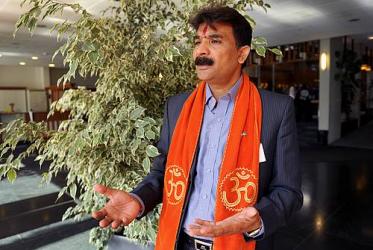Displaying 61 - 80 of 170
17 December 2014
Momentum builds for ban on nuclear weapons
16 December 2014
WCC condemns the killing of Christian couple in Pakistan
11 November 2014
Concern over recent developments in Pakistan’s Asia Bibi case
28 October 2014
WCC general secretary speaks on reality of wars at Sant’Egidio meeting
12 September 2014
Use of armed drones condemned by WCC
13 February 2014
Hope born in the womb of God
05 November 2013
Thursdays in Black: zero tolerance for violence against women
11 October 2013
WCC urges Pakistan to protect communities from terrorism
03 October 2013
Sorrow over church bombings in Pakistan
23 September 2013
Consultation brings rights of religious minorities into focus
18 September 2013
WCC in solidarity with Christians attacked in Pakistan
12 March 2013
Hindus in Pakistan are a forgotten community
20 September 2012







